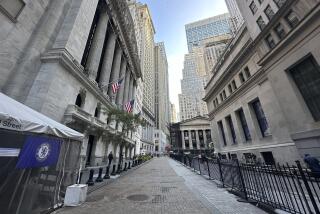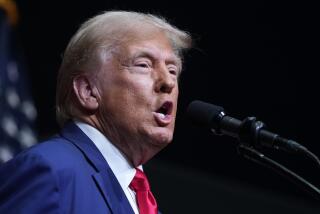Bernanke urges Obama, Congress to strengthen recovery
Reporting from Washington — Federal Reserve Chairman Ben S. Bernanke, insisting that the long-term U.S. economic prospects remain good, took aim at Washington policymakers for causing upheaval in financial markets and failing to do their part in bolstering the flagging recovery.
Bernanke did not rule out new action by the central bank to stimulate growth, but he emphasized in a much-anticipated speech Friday that the Fed could do only so much by regulating interest rates and other monetary policy.
He practically goaded the White House and Congress to do more to create jobs and strengthen the economy using fiscal policy, which would include both tax cuts and federal spending.
Although it is important to reduce the nation’s deficits over time, he said in unusually blunt language for a central bank leader, it would be a mistake to “disregard the fragility of the current economic recovery” and create “fiscal head winds,” a reference to short-term spending cuts at a time of immediate economic needs.
Some analysts took Bernanke’s speech as a sign that the Fed was prepared to provide new monetary stimulus, possibly as early as its next policymaking meeting in late September.
“He basically punted until then,” said Cornelius Hurley, a Boston University professor and a former assistant general counsel at the Fed.
Rep. Brad Sherman (D-Sherman Oaks) said Bernanke would probably have to take some action because no major fiscal stimulus was likely to come out of the deeply divided Congress and a “political system that is mostly broken.”
Bernanke spoke at an annual Fed conference in Jackson Hole, Wyo., shortly after the government released a report that revised downward the second-quarter economic growth to a meager annual rate of 1%, from 1.3%.
The revision was largely a result of weaker exports. On the other hand, private spending and investment in the April-through-June period were slightly higher than initially estimated.
Growth in the second half of this year is expected to be a bit stronger, but consumer spending — a major driver of the economy — remains weak amid sluggish hiring and stagnant income gains.
And economists said the risks of a double-dip recession have risen sharply as the debt crisis in Europe and the political firestorm over the debt ceiling in Washington and the subsequent downgrade of U.S. debt have jolted Wall Street and taken a toll on public confidence.
Bernanke blamed the nasty debt-limit battle for disrupting the markets and “probably the economy as well.”
“The country would be well-served by a better process for making fiscal decisions,” he told central bankers, economists and others gathered at Grand Teton National Park. “Fiscal policymakers could consider developing a more effective process that sets clear and transparent budget goals, together with budget mechanisms to establish the credibility of those goals.”
And he warned that continuing partisan warfare over economic policy could inflict long-term damage, no matter what policy decisions were ultimately made.
“Similar events in the future could, over time, seriously jeopardize the willingness of investors around the world to hold U.S. financial assets or to make direct investments in job-creating U.S. businesses,” he said.
Stock markets, which have been on a roller-coaster ride since the downgrade of U.S. debt earlier this month, initially fell after Bernanke’s remarks. But they quickly bounced up, with the Dow Jones industrial average finishing 134.72 points higher, or 1.2%, at 11,284.54.
Some investors had hoped Bernanke would signal a new round of major Treasury bond purchases, as he did a year ago at the same conference, in a bid to drive long-term interest rates even lower and stimulate more lending.
But having already flooded the financial system with hundreds of billions of dollars and pledging earlier this month to keep short-term interest rates near zero for two more years, Bernanke echoed many outside economists in questioning how much bang the Fed could get with another fat dose of bond purchases.
“The Fed has done everything possible — and then some,” said Alice Rivlin, a former Fed vice chairman and a senior fellow at the Brookings Institution. “I don’t think anybody is convinced that [additional] monetary policy could affect the recovery greatly. If there is action, it has to come from fiscal authorities.”
President Obama is preparing to deliver a speech after Labor Day outlining a new job-creation plan that could include an extension of the Social Security payroll tax cuts and long-term unemployment benefits, as well as a boost for infrastructure work and job training.
But many doubt that Obama could push most of his proposals through a House controlled by Republicans who have insisted on reducing spending and cutting back the government’s role in the economy.
In his speech, Bernanke acknowledged that the recovery has been slower than expected — and not just because of temporary factors, such as high oil prices and the earthquake and tsunami in Japan. He attributed some of the persistent weakness to the deep slump in the housing market and a financial crisis of historic proportions.
Bernanke sought to reassure people that the U.S. economy, despite all its problems, had not lost competitive advantages that could lead to long-term growth and prosperity. He mentioned America’s diverse economy, technological superiority, entrepreneurial culture and research capabilities.
“Although important problems certainly exist, the growth fundamentals of the United States do not appear to have been permanently altered by the shocks of the past four years,” he said.
At the same time, Bernanke noted that some of the short-term problems — and the policies taken or not taken to address them — could present long-term troubles.
Specifically, he cited the large numbers of unemployed people who have been without work for more than six months, a group that now constitutes nearly half of the 14 million people who are officially jobless.
“Under these unusual circumstances,” he said, “policies that promote a stronger recovery in the near term may serve long-term objectives as well.”
More to Read
Inside the business of entertainment
The Wide Shot brings you news, analysis and insights on everything from streaming wars to production — and what it all means for the future.
You may occasionally receive promotional content from the Los Angeles Times.











